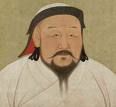
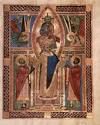
















A Quick History of the Monarchs of Germany and Austria |
© Copyright by T.L. Winslow. All Rights Reserved. |
Last Update: Dec. 18, 2017. |




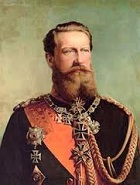





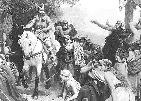
Germany's founding battle? The original Dortmund Pocket and the genesis of the myth of German superiority? In 9 C.E. Germanic (Cherusci) chief Arminius (Hermann) (OG "army man") (-17 to 21), who served in the Roman army from 1-6 C.E., obtained Roman citizenship and a knowledge of Roman military tactics, becoming an equitae ("sir"), and returned home in 7 C.E. to find his people being oppressed by haughty Roman gov. (legate) Publius Quinctilius Varus (b. -46) gets pissed-off and organizes a revolt, throwing Varus off-guard by letting him think that Germania is already a Roman province and he is their gov., feeding him with lawsuits to settle to prove his wisdom, then playing him for a suckah and leading Gorgeous W. Bush, er, Varus and his three legions (20K men) (10% of the entire Roman army) into a trap, where his unarmored warriors outthink, outwit, outlast, and massacre them in the 3-day Battle of Teutoburg (Teutoburger) Forest (Wald) in modern-day Kalkriese near Cologne in modern-day North Rhine-Westphalia, West Germany, N of Colonia Agrippina and Mainz; the battle is not fought in the forest but out in the open, with the Romans trapped between the hills and bogs; the Germans commit atrocities against the loser Romans incl. nailing their heads to trees, cutting the throats of officers on pagan altars, and cutting out tongues and sewing up the mouths; the big V temporarily unites chieftains from modern-day Holland to Poland against Rome; Varus' head is sent back as a present; according to Tacitus, Varus attributes the valor of the Germans to their copious use of beer; the news causes panic in Italy, and Augustus goes apeshit, wandering around his palace for months crying "Varus, give me back my legions", and begins to decline into an old fart, ordering the Rhine River to become the permanent border between the Romans and the Germans, while Tiberius is transferred to the Rhine frontier to try to plug the dyke; all hopes of a new N frontier for the Roman empire are abandoned, and the Romans go permanently on the defensive, creating a permanent division between N and S Europe, allowing the Germans to develop a strong nat. consciousness and breed hordes of Roman killers on their own timetable to exploit the fatal mistake of lack of noive that ultimately dooms the supposedly merciless Romans, who fall in 476 C.E.; this fatal decision outlasted the Roman Empire, forever splitting Europe into the German-speaking north and the Latin-speaking south, which was a big reason for the Protestant Reformation, and even carried over into America; people still can't overcome it today?

Up until almost the year 1000 C.E., the Germans were the bad guys, the hated pagan invaders and despoilers of Roman civilization, blonde beasts who worshipped trees in the forest and stunk like a guy, like Alaric I (370-410) (German for "king of everything"), who sacked Rome in 410 and triggered the Titanic-like last years of the Roman Empire. And even when they settled down and got halfway civilized and finally saw the light of Christ, they couldn't get the Three-in-One thang and became Arian heretics. Call them slow, but they finally came around along with the Norse, Russians and just about everybody else as the big First Millennium approached, the centuries of missionary hype working on their minds to make them line up to take their baths and become PC Christians and get their passport ID cards for Armageddon from the pope, just in case, fingers crossed. The Russkies decided to get their tickets punched by the Byzantine pope, but that's another story. The fact that the Germans were kissing cousins of the well-tamed Roman Christian Franks led to the big breakthroughs, and the damage done by the Vikings to France made the popes begin looking to the Germans as their new source of red roses for a blue lady.



In 936 Otto I the Great (912-73), son of Duke Henry I the Fowler of Saxony and Mercedes Benz was crowned the first king of Germany in Aachen by the archbishop of Mainz, his coronation banquet reviving the Carolingian tradition (based on the Roman tradition), with the duke of Franconia serving as ceremonial steward, the duke of Swabia as cupbearer, the duke of Lorraine as chamberlain, and the duke of Bavaria as marshal - no more pagan shamans sacrificing maidens on sacred oaks? He then spent three years gaining control over the duchies of Bavaria, Franconia, Lorraine and Saxony, keeping all of them except Saxony in his own hands or those of his family, then went on to prove his value to the pope time and again, and in 955 he defeated the Magyars near Augsburg and the Slavs (Wends) at the Recknitz River, and colonized Austria. In 961 a missionary he sent finally converted the pesky Danes, taking him over the top, and in 962 he was invited to Rome by grateful Pope John XII to end the feudal anarchy of Rome and revive the dead (since 924) Holy Roman Empire (HRE) (ends 1806) (which is only called the Roman Empire until 1157) as its Charlemagne II, crowning him Roman emperor of the West, shifting the old Roman-Frankish alliance to Roman-German. Too bad, the resurrected Roman Empire gts off on the wrong foot when this pagan-inside Saxon let it go to his head and considered himself higher than the pope, ordering all future bishops of Rome to swear fealty to him while claiming the right to approve papal elections, starting a perennial fight which lasted until the Concordat of Worms in 1122. Even worse, an eternal struggle began between pope and emperor for supremacy, with the pope usually winning at the expense of making the emperors and nationalists bitter, leading up to the Protestant Reformation in the 1500s. Otto I was succeeded by his son Otto II the Red (955-83) and his grandson Otto III (980-1002) (983-1002) - the original 2-door coup and 3-door hatchback?






The Ottos were 10th century news. The 11th century starts out with the new non-Saxon Henry line, beginning with Otto III's cousin (St.) Henry II the Saint (973-1024) on June 7, 1002, who built Bamberg Cathedral in 1004-12 as an outpost against the pesky Slavs, beginning the anti-Slav prejudice of the "pure Aryan" Germans that culminated in the Nazi atrocities of WWII? In 1024 Conrad II the Salian (990-1039) founded the Salian Dynasty, beginning Germany's imperial age, which was expanded by his son Henry III the Black (the Pious) (1017-56), who ruled most of Bohemia, Poland, and Hungary, and started the fractured feudalization of Germany that later caused every valley to become a one-horse princedom or dukedom filled with peasants and serfs. In 1056 his young son Henry IV (1050-1106) started out being dominated by his pious regent mother Empress Agnes (Gr. "pure") of Poitou (Poitiers) (1025-77), who sold the store to the Church. In 1062 he was actually kidnapped by some German princes working for Archbishop Anno II of Cologne, who staged a coup and assume the regency under Archbishop Adalbert of Hamburg-Bremen, then divided the monasteries between themselves, robbing the crown blind. After throwing them off in 1066 (the Norman Invasion of England Year), he assumed personal rule and began a revenge tour to get it all back, turning the Church into his own piggy bank by selling clerical offices for cash, beginning the Great Investitute Dispute in 1075, a war with mean midget Pope Gregory VII (1023-85) (AKA Hildebrand), the pope who fought to make the Church King of the World. The opening rounds saw Henry getting Gregory deposed, followed by Gregory excommunicating Henry, which back then carried more juice, so you can guess who wins the decision after 30 rounds.





The 12th century starts out with Henry V (1081-1125), backed by Pope Paschal II (-1118), capturing and imprisoning his own daddy Henry IV and taking the German throne in 1104. In 1125 his Saxon successor Lothair II/III of Supplinburg (1075-1137) ended the Salian Dynasty, but not without a fight with Henry V's Hohenstaufen nephews (sons of Duke Frederick of Swabia) Frederick (later Frederick I Barbarossa) and Duke Conrad of Franconia (later Conrad III), who finally gave up and waited in the wings for him to croak. In 1138 Conrad III (1093-1152) was crowned king of Germany in Aachen, founding the Hohenstaufen Dynasty (ends 1254), named after their Swabian castle Staufen. Too bad, Lothair III's Welf son-in-law Henry X the Proud (1108-39) got pissed off at being passed over, causing him to start a century-long civil war between the pro-pope Welfs (Guelphs) (Guelfs) and anti-pope Ghibellines.

In 1152 Conrad III's nephew Frederick I Barbarossa (Ger. "red beard") (1122-90), son of Hohenstaufen Duke Frederick II of Swabia and Judith (daughter of Welf Duke Henry IX the Black of Bavaria) became king, uniting the rival houses of Hohenstaufen and Welf, taking out all the old stained-glass windows and installing new ones.





Too bad, in 1190 still-spry Barbarossa was drowned in the Saleph River in Asia Minor while out on the Third Crusade fighting the Saracens, and his son Henry VI (1165-97) became king of Germany and HRE. Too bad, after his 1197 death the Welf-Ghibbeline Thang popped up, and the Ghibellines elected Barbarossa's son Philip of Swabia (1177-1208) (whose power base is in S Germany) as their boy, while the Welfs elected English-educated Otto IV of Brunswick (1175-1218), son of Duke Henry the Lion of Saxony and Matilda (daughter of Henry II of England) (making him the nephew of Richard I Lionheart), beginning a 10-year war for supremacy, which Otto IV won, being crowned HRE in 1209 by Pope Innocent III (1160-1216), who had been playing kingmaker all along, and who then got pissed-off at him and got him excommunicated and deposed in 1212 in favor of his well-educated personal ward Frederick II Hohenstaufen (1194-1250), son of Henry VI and Constance of Sicily (daughter of Norman king Roger I of Sicily) and grandson of Barbarossa, who immediately issued the Golden Bull of Sicily (Sept. 26, 1212) in Basel, a decree proclaiming Bohemia a kingdom and Bohemian princes hereditary kings, while promising his holy foster pa not to unite Germany and Italy via his connection with Sicily. Too bad, Frederick II promptly reneged, setting up his HQ in sunny Sicily, and became a little too learned, becoming the "stupor mundi" (amazement of the world), writing well-circulated anti-clerical tracts that expose Church corruption, and even worse, openly courts the Muslims for their advanced learning, causing rumors of infidel and sorcerer to float around, which back in those days wasn't too good for one's health.




When Frederick II died in 1250, he left his legitimate son Conrad IV (1228-54) the throne of Germany, Jerusalem, and Sicily (as Conrad I), and made his other crypto-legitimate son (did she or didn't she marry him first?) (he claims he is, and both have the same love of poetry and science?) Manfred of Sicily (1232-66), prince of Taranto and Conrad's representative in Italy. Meanwhile Pope Innocent IV (-1254), who had no love-hate struggle to worry about continued his predecessor's struggle against the Hohenstaufen succession, stirring up revolts in numerous cities, all of which Manfred was able to subdue except pesky Naples. Meanwhile departed Frederick II became "Gran Frederigo", the hero of southern Italians, who lapped up his book on hawking, some of the first known Italian poetry, plus Latin translations of Aristotle, all launching a mini-Reformation in Italy, even if he was German. Pope Innocent IV went on to excommunicate Conrad IV, and after he died of malaria in 1254, his brother Manfred continued the HoHo Hohenhstaufen fight with the P aPa Papacy, seizing the regency of Sicily for Conrad IV's infant son (his nephew) Conradin (1252-68) (until 1258), while Pope Innocent IV conferred the crown of Sicily on Edmund Plantagenet, 2nd son of Henry III of England, in return for assuming a papal debt of over £90K for this war, and when he agreed, papal forces invaded Sicily, after which Manfred restored the kingdom to the papacy, and the pope attempted to help Henry pay his debt obligation by a tax imposed on the English clergy, pissing them off. Meanwhile Pope Innocent IV kicked off in 1254, leaving things in limbo again, and the Great Interregnum began.

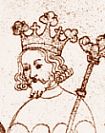

In 1273 despite up-and-coming Ottokar II (1230-78), "the Iron and Golden King" of Bohemia (son of Bohemian king Wenceslaus I and grandson of Philip of Swabia) seeking the German crown, Count Rudolf of Hapsburg was elected German king Rudolf (Rudolph) I (1218-91), and crowned at Aix-la-Chapelle, founding the Hapsburg (Habsburg) ("Hawk's Castle") Dynasty, which ruled Germany until 1806, and whose heirs are known for their ugly big hoglike Hapsburg lips. The same year the Great Interregnum ends as he was crowned HRE Rudolf I by Pope Gregory X (1210-76) in Lausanne, Switzerland, becoming a papal V over the formerly uppity Hohenstaufen German-owned Holy Roman Empire, marginalizing its political and religious power in Europe and making the imperial title little more than honorary (until 1314). After being put up to it by his queen Kunigunda, Ottokar II tried to win the German throne by arms, and was defeated and killed at the Aug. 26, 1278 Battle of Durnkrut (Dürnkrut) (Marchfeld) on the Marchfeld (Moravsko Pole) in northeast (Lower) Austria, giving the Hapsburgs control of Austria too (until 1918). Too bad, the Hapsburgs otherwise only controlled southern Germany, leaving the rest of Germany to the zillion other petty princes, which kept Germany from uniting under its own emperor until 1870.


In 1291 after Rudolf I died, the electors rejected his Hapsburg son Albert (Albrecht) I (1255-1308) as king of Germany in favor of Count Adolf of Nassau-Weilburg (1255-98), making Albert I the duke of Austria, but he wouldn't take no for an answer and gained the throne in 1298 after getting Adolf killed. Meanwhile, taking advantage of the confusion, and vowing never to be ruled by any blinking Hapsburg, the Swiss forest cantons of Uri, Schwyz and Unterwalden formed the League of the Three Forest Cantons (Everlasting League) for mutual defense, which went on to get the other cantons to join and finally achieved Swiss independence in 1474.
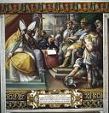




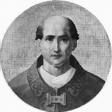

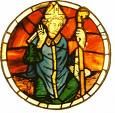
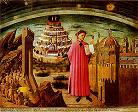
In 1308 Albert I was murdered by a disinherited nephew, and Francophile Henry VII of Luxembourg (1275-1313) was elected German king and HRE, going on to marry his son to the sister of King Wenceslas of Bohemia in order to make Bohemia a possession of the house of Luxembourg. In 1309 the Babylonian Captivity of the popes in Avignon, France began (until 1377), throwing a monkey wrench into Euro politics, and Henry VII sided with the winning side, invading Italy in 1310 with 5,000 troops to fight for Avignon-based Pope Clement V and the Ghibelline anti-Roman pope cause, with Italian super-poet (inventor of the Italian language itself) Dante Alighieri (1265-1321) (a Guelph who got on the wrong side of their internal split, going with the losing White Guelphs and ending up exiled from Florence by the Black Guelphs, turning him against them) cheering him along on the sidelines as the new Charlemagne. Too bad, Henry VII died in 1313, and was succeeded by Francophile-not Louis (Ludwig) IV the Bavarian (1282-1347), head of the House of Wittelsbach (founded 1119), who was crowned in Bonn by the archbishop of Cologne instead of the usual site of Aachen, and immediately faced an 8-year civil war over the imperial title with anti-king Frederick III the Fair (Handsome) (1289-1330), duke of Austria, who was supported by his brother Duke Leopold I of Austria (1290-1326) and enjoyed the backing of the Avignonese popes, while Louis IV was backed by the German people and the Franciscans, causing a propaganda war led by Marisilius of Padua (1270-1342) and William of Ockham (Occam) (1280-1347) on the German side. In 1328 Louis IV tried to force the issue by invading Italy and getting a "lay coronation" by the Ghibellines in Milan, then personally deposed the French bum Pope John XXII (1249-1334) in favor of his own antipope, which was only a symbolic V but very satisfying. The untimely death of Fred Handsome in 1330 left the field to Louis IV, but when he still couldn't get the pope to crown him HRE, he convened the Diet of Frankfurt in 1338, which declared that the HRE will be chosen by electors without the approval of any pope - so there? During Louis IV's reign the imperial chancery first adopted German instead of Latin for use in official documents, jawohl you spaghetti-slingers.
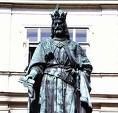
Despite all the above, Louis IV the Bavarian was deposed in 1346, and papal-backed Charles IV of Luxembourg (1346-78) was elected German king, turning Prague into a top Euro city with its own university (founded 1348). Too bad, the Black Death hit Germany in 1348-9, and screwed everything up, causing massacres of scapegoat Jews followed by hordes of pockmarked Christian Flagellants going around punishing themselves for being bad and bringing God's judgment on them for masturbating. In 1356 Charles IV issued the Golden Bull of 1356, turning the HRE from a monarchy into an aristocratic federation, creating seven hereditary (by primogeniture) electorates with the power to elect an an emperor by majority vote, with a supervisory function over the empire, with the crown required to remain in the house of Luxembourg. A good idea that comes too late, it's also too bad, as it "codifies anarchy and calls it a constitution", making pan-German kingship an impossibility and insuring a disunited Germany until the time of Bismarck.




In 1376 Charles IV died, and his lazy drunkard son Wenceslaus the Drunkard (Lazy) (1361-1419) became German king, getting caught up in the turmoil caused by Jan Hus (1369-1415), getting deposed as HRE in 1400 in favor of Rupert (Ruprecht) III of the Palatinate (1352-1410), but remaining king of Germany until his younger brother Sigismund I of Luxembourg (1368-1437) (known for having a thang about the long-face look) took that off his hands in 1411, taking his title of king of Bohemia too when he croaks in 1419, and inheriting the horrible Hussite Wars, with the Hussites having it in for him bigtime for betraying Hus into the hands of the BBQ chefs at the 1414 Council of Constance, which delayed him in getting crowned HRE until 1433.

In 1437 Sigismund I died after naming his brother-in-law Albert II the Magnanimous of Hapsburg (Germany) (1397-1439) (AKA Duke Albert V of Austria) (a descendant of Bela IV of Hungary, with that swarthy Hun look - perfect product?) as his successor, who became king of Hungary, Bohemia and Germany, but was never crowned HRE, and died defending Hungary against the horrible Muslim Turks.

On Feb. 2, 1440 Albert II's distant cousin Frederick III (1415-93), known for his motto "AEIOU" ("Austria Est Imperare Orbi Universo") (It is Austria's Destiny to Rule the World) became king of Germany, but was not crowned HRE until 1452 after a lot of messy details, starting with getting Albert II's posthumous son Ladislaus (Ladislas) (Laszlo) V Posthumous (1440-57) out of the way, barbecues and broken backs, everything gets a little sicker this far south. Too bad, he must have meant the Old World, as the discovery of the New World in 1492 by Southern European (Italian-Spanish) Christopher Columbus (1450-1506) left Austria out in the cold, and they don't get a piece, causing Austrian power to shrink like 99 leaky condoms, er, luftballons, until by the 20th century Austria became a picturesque tourist destination featuring the Von Trapp singers singing Do-Re-Mi-Fa-So-La-Ti-Do, while uncrowned HRE Arnold Schwarzenegger saw the light and emigrated to the U.S. and married into the Kennedy clan.





In 1484 Pope Innocent VIII (1432-92) was crowned, going on to pump up the Spanish Inquisition with the new bestselling manual Malleus Maleficarum ("Witch Hammer") and send Inquisitors to Germany to hunt down, torture and execute witches and sorcerers. Too bad, with all them princes running around that are pretty much untouchable, the net result was only to piss them off and make them want to dispense with all popes. In 1486 amid the fun and games Frederick III got his son Maximilian I (1459-1519 elected German king to groom him for the big imperial chair, which he took over in witch-free 1493, getting crowned HRE in 1508 and going on to expand the influence of his happy house of Hapsburg through war and marriage, starting with his wife Bianca Maria Sforza (1472-1510), daughter of the duke of Milan, whom he used as an excuse to horn into Italy, losing only after French intervention, his troops bringing back a big dose of the New World syphilis. In 1495 Maximilian I led the Reichstag at Worms, which reformed the imperial constitution, right before Italian (or Spanish) (or Portuguese) (or Jewish?) sailor Christopher Columbus discovered the New World, changing everything, since Germany is pretty much landlocked and out of luck. In 1499 Maximilian I granted Swiss independence in the Treaty of Basil. In 1508 he made a point of taking the title of "Elected HRE", ending the age-old custom of requiring coronation by the pope, but only after Italian Pope Julius II (1443-1513), "the Warrior Pope" gave his okay between choir boys, it's an adventure for two of all ages, the wildlife experience.









Just when the shock of discovering a whole New World not mentioned in the Bible for 1400-plus years is being absorbed, along come two pesky Germans to throw a new monkey wrench in the works. The first was Johannes Gutenberg (1396-1468), who around 1440 invented the printing press, after which it was systematically improved and propagated through Europe, originally being used by the pope to mass-produce indulgences so that monks could go around hawking them to pay for his Croesus lifestyle. The second was pissed-off Roman Catholic monk Martin Luther (1483-1546) who rocked Europe on Halloween (October 31) of 1517 by nailing his 95 Theses to the door of the Castle Church of Wurttemberg, er, Wittenberg, complaining about the way that the popes have become servants of Satan into every sin in the book, and using the Book to show that their authority is bull, launching the Bible-thumping Protestant Reformation, which spread via the newfangled printing press and was backed by powerful German princes who had centuries of grudges of their own to list, giving him a safe base while he cranked out the vernacular Bibles and has them spread all over Europe to turn heads. (Maybe it's just a poetic justice, the former pagan side of Europe swallowing the Christian religion of the supposedly superior Mediterranean side hook-line-and-sinker, then realizing they were told not to read them bothersome Bibles, and staging a reverse revolution to show their intellectual northern Norse Aryan superiority?) Meanwhile in 1519 looks-good-in-black Charles I of Inquisition-loving Spain became HRE Charles V (1500-58), spending a full life torturing and burning pesky porno-reading Protestants, at the end of which in 1558 he retired to a monastery, giving his title and the fun toys to his younger brother Ferdinand I (1503-64), who only lasted eight years. He was succeeded by his son Maximilian II (1527-76), who gave the Roman Catholic establishment a thrill when he showed too much sympathy for Lutheranism and had to pass a Roman Catholic loyalty test in 1562 first. He in turn was succeeded by his eldest son (ugly Hapsburg lip and all) Rudolf II (1552-1612), a math-science freak who didn't enjoy burning heretics like he should, and suffered an emotional breakdown in 1577, moving from Vienna to Prague and becoming a recluse who liked to study astronomy and magic and collect curious thingies, including Johannes Kepler (1571-1630) and Tycho Brahe (1546-1601) (a Dane), who were busy creating yet another New World, in the sky, with their minds, based on the prior work of Polish astronomer Nicolaus Copernicus (1473-1543), cis boom ba, I downloaded the sales video, good stuff.

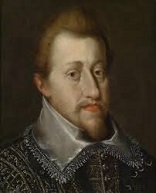


In 1612 Rudolf II's brother Matthias (1557-1619) became HRE, followed by Bavarian duke Ferdinand II (1578-1637) in 1619, who was so rabidly Jesuit-controlled that his election triggered the Bohemian Revolt of the Czech Estates in 1618-20, with the Protestant-controlled Bohemian Diet telling him to buzz off while electing their own man Frederick V, Elector Palatine (1596-1632), Protestant elector of the Rhenish Palatinate of Bohemia, triggering the first "modern" war, and the first heavily influenced by merchants and trade. Too bad, Frederick didn't last long, becoming known as the Winter King, and his Scottish wife Elizabeth Stuart "the Queen of Hearts" (1596-1622) as the Winter Queen after they got their butts kicked in 1620, and Bohemia became YAMCC (yet another miserable Catholic country). Meanwhile the Catholic-Protestant hate escalated into the Thirty Years' War of 1618-48. When you're safe asleep, who do you want answering the phone?

In 1637 Ferdinand II's eldest son Ferdinand III (1608-57) became HRE, inheriting a war with France and Sweden that dragged on for 11 years until the 1648 Peace of Westphalia, goofing in 1644 by giving all rulers of German states the right to conduct their own foreign policy, which permanently diluted imperial power bigtime.



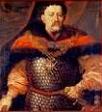



In 1654 Ferdinand III's eldest son Ferdinand IV died of smallpox, and in 1655 Ferdinand III's second son (by first wife Maria Anna of Spain), Hapsburg-lipped Jesuit-dominated Leopold I the Hogmouth (1640-1705) became king of Hungary, then king of Bohemia in 1658, king of Croatia in 1657, and HRE in 1658, defeating a plan by French cardinal Jules Mazarin (1602-61) to break the Hapsburg succession at the expense of giving France some influence in the internal affairs of Germany. He went on to a 47-year reign, during which he faced-off against Louis XIV of France in three wars, culiminating in the War of the Spanish Succession in 1701-14. A music lover, he turned Vienna into the place to be. Meanwhile he was plagued by pesky Protestants and Ottoman Muslims, almost losing it in 1683 when the latter invaded Austria, until his Hapsburg counterpunch led by heroes Prince Eugene of Savoy (1663-1736) and Jan (John) III Sobieski (1629-96) of Poland saved Austria for good Catholic Schwarzeneggers, and kicked the Muhammad cultists back to Constantinople, while keeping their sacks of coffee beans and starting a habit that became big in the U.S. later after the 1773 Boston Tea Party as a protest drink. The other nasty habit of tobacco smoking was already brought back by Columbus, so what's the plan, sounds good and looks even better? In 1683 Leopold I's eldest son Joseph I (1678-1711) was crowned king of Hungary, then king of Germany in 1690, and HRE in 1705, relying on trusty Prince Eugene of Savoy to get him through the battles with Louis XIV's armies, while turning against the pesky Jesuits and instituting liberal reforms. Speaking of liberal reforms, the pesky Scientists were at again, this time new chicken bambino Sir Isaac Newton (1643-1727) in England, and his Alaskan girlfriend Gottfried Wilhelm von Leibniz (1646-1716) in Germany, the first discovering Calculus and the Law of Gravitation, the second supplying the fancy theoretical work for academic sticklers, plus the binary system for computers. The idea that the heavens are not fundamentally different than the Earth, but are subject to the same laws, is profound, shocking, unsettling, and finally reassuring, and maybe the biggest thought thought revolution ever since the shocking idea that a man was the only begotten son of God, it's got my vote plus the delegate lead, the math and the momentum.


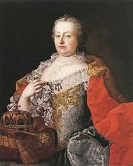




In 1711 Joseph I died suddenly, and his younger brother Charles VI (1685-1740), who had been the object of the War of the Spanish Succession took the con, introducing Spanish court cermonial in Vienna along with the Spanish Riding School for the famous Lipizzaner Stallions (Hapsburgs should know about lips). Too bad, he choked on some Death Cap mushrooms in 1740, leaving daughters Maria Theresa (1717-80) and Maria Anna of Austria (1718-44) and no sons, but he had planned for this eventuality, trying to get around the Salic Law with the Pragmatic Sanction of 1713, which the male chauvinists outside Austria didn't buy, triggering the War of the Austrian Succession. Archduchess Maria Theresa proved to have Hillary Clinton's iron balls and survives, but was not allowed to become HRE, being passed over for Prince Charles of Bavaria, who in 1742 became Charles VII (1697-1745). Meanwhile in 1714 George I (1660-1727) of Hanover became king of England, founding a regime that lasts to this day. More germane to the fate of Germany, in 1740 new Jaws Frederick II the Great (1712-86) of Prussia arrived at the beach, bringing the jack-booted goose-stepping Prussian war-is-everything movement into Germany, which gradually took over everything by 1870, just as the world was shrinking and pan-German unity was not an option. Too bad it was them, and not the minuet-loving Austrian Hapsburgs?

In 1745 Charles VII kicked the coffee can, and Maria Theresa made a comeback via her hubby Duke Francois Stephen of Lorraine, who took over as Francis I (1708-65), with her taking up the rear, keeping the imperial title in the Hapsburg family like her daddy wanted.


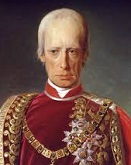

Speaking of music, in 1765 tin-eared Joseph II (1741-90) became HRE, starting his reign under total domination of his mutter Maria Theresa, and becoming famous for failing to recognize the potential of child prodigy Mozart, mainly because mommy got pissed off at his daddy allowing him and his child prodigy sister to play for filthy lucre before mere commoners, cheapening them to beneath their dignity. After Maria Theresa snubbed the pesky Yanks and their American Revolution, then croaked, and Joseph II croaked too, he was followed by another (3rd) son of Maria Theresa, Leopold II (1747-92), who died before he could carry out his plan to stop the French Revolution, then his son Francis II (1768-1835) in 1792, who for next 23 years had the big problem of living in the Age of Napoleon, was a good diplomat and survived beautifully. After his armies were defeated at Austerlitz in 1805, in 1806, fearing that Napoleon was about to steal it, he abolished the title of Holy Roman Emperor and became emperor of plain Austria (until 1835), then married his daughter Marie Louise (1791-1847) to the prick in 1810, and sent his man Prince Clemens Wenzel Nepomuk Lothar von Metternich (1773-1859) into the diplomatic front lines, using his gift of gab to maneuver himself to the head of the anti-Napoleon alliance that defeated him in 1815 at Waterloo, and presided over the Congress of Vienna, making Austria the #1 power in Europe. Too bad, he never 'got' that American thang, and went reactionary, engineering the Holy Alliance, which instituted repression throughout Europe, triggering the republican revolts of 1848 after he kicked off.




In 1815 the Treaty of Vienna recognized the German national revival caused by Napoleon's shenanigans, and formed the Confederation of 39 German States as the successor to the Holy Roman Empire. In 1835 epileptic Ferdinand I (1793-1875) became emperor of Austria and king of Bohemia, running into the tidal wave of the 1848 liberal and national revolutions, and abdicating in favor of his son Franz Josef (Francis Joseph) "Franzl" I (1830-1916), who reigned for 68 years, #2 longest in European history after Prince Johannes II of Liechenstein, who is #1 with 70. Meanwhile Austria and Prussia became two scorpions in a bottle, and in 1861 Wilhelm (William) I (1797-1888) became king of Prussia, hiring Iron Chancellor Otto von Bismarck (1815-98), who skipped gym and planned it right, equipping his troops with the technological breakthrough Needle-Gun, and in 1867 after the Seven Weeks' (Austro-Prussian) War (June 8-July 26, 1866), victorious Prussia dissolved the Confederation of 39 German States in favor of the Confederation of Northern Germany, consisting of Prussia and 22 northern (plus a few southern) German states, while the rest of the southern German states held out, and the Austrian Empire was renamed Austria-Hungary, and set up as a patsy for future expansion by Bismarck.




On January 18, 1871 after kicking France's butt in the Franco-Prussian War, Prussia declared the Second Reich under German emperor (kaiser) (not "emperor of the Germans", because that would have been a claim to Austria, Switzerland, and Luxembourg also) Wilhelm I, and the Hohenzollern family, which had ruled Brandenburg since 1415 and Prussia since 1701 now rules Germany too (until 1918). When he died in 1888, his brother Friedrich III (1831-88) (a liberal Anglophile who was married to Princess Vicky, eldest daughter of Queen Victoria and Prince Albert) took over, promising an era of friendly German-British relations. Too bad, his daddy made him wait in the wings too long, and he croaked after 99 days from throat cancer, leaving the kaisership to his worst-nightmare son Kaiser Wilhelm II (1859-1941), who had a withered arm from a traumatic breech birth, causing him to always pose it at a dignified angle in photo opps, Aqua Velva, men get it. Instead of pursuing his daddy's course of family room, media room and backyard, he threw Bismarck overboard in 1890 to steer Germany on his "New Course" of global expansionism, which caused it to bump up against Britain, France, Russia, Austria, and everybody else (the New Kid on the Block U.S.), leading to the July Crisis and the Guns of August of 1914, and the Great War (World War One) of 1914-8, triggered by the assassination of Austrian heir presumptive (since 1896) Archduke Franz Ferdinand (b. 1863) on June 28, 1914 in Sarajevo, after which the giant German-Austrian-Hungarian war machine, strangely allied with their old mortal enemy the Ottoman Empire took on France, Britain, and Russia before the U.S. got over its George Washington Era of Grand Isolation and came to the rescue and shut them down, developing an anti-Hun mentality in the process, although Huns are Hungarians not Krauts, as if they cared, they all talk funny.

Meanwhile in 1916 during the Great War devout Roman Catholic Charles I (1887-1922), nephew of Archduke Francis Ferdinand became king of what was left of Austria-Hungary until his "proclamation" (he later denies it's an abdication) of Nov. 11, 1918, becoming the last monarch of the Hapsburg Dynasty, after which the Austrian First Republic was formed (ends 1938), along with the German Weimar Republic (1919-33), with the new specter of Bolshevik Russia making a wiener out of you, causing the Allies to launch their ineffective League of Nations after the signing of the Treaty of Versailles on June 28, 1919 to make WWI the War to End All Wars, big chuckle, quick, name three things you like about your job. The once extensive Hapsburg Empire was dismembered until Austria was little more than a quaint Alpine tourist trap, and the Ottoman Empire was also dissolved, leaving only Turkey and a bunch of Muslim states that will later become Osama bin Laden's oysters, while the western side of Russia was carved up into Poland, Finland, Estonia, Latvia and Lithuania, giving both Germany and Russia eyes bigger than their stomachs.

To make a long story short, the unfair armistice terms and Great Depression let the street thug party of Adolf Hitler (1889-1945) take over and set up the the Third Reich (1933-45), and the Nazis moved into Austria and set up the Austrian Anschluss (1938-45), then plunged the world into World War II, killing 50 million for the Aryan master race and German world domination, and stinking Germany up for the next who knows how long. Meanwhile the U.S. finally grew up and got nukes and tested them on yellow slant-eyed nonhuman Japs, only to hand them to the Soviets on a silver platter with its Zero Homeland Security Department, then let the nuclear genie out of the bottle and allowed them to proliferate to Britain, France, Pakistan and India, Israel, China, North Korea, South Africa, and who knows, think twice, it's another day for you and me in paradise.

After Hitler lost and shot himself before the Soviet Red Army could get him, his beloved German Empire was carved up, and Germany was divided into Soviet-run East Germany and U.S.-friendly West Germany (1945-90), launching the James Bond 007 Cold War. Meanwhile the Austrian Second Republic was formed in 1945, right before the Virgin Birth of the Austrian Christ Ahnuld (Arnold Schwarzenegger) (1947-) and his Irish-American Mary Magdalene Maria (Shriver) (1955-), which makes the U.S. Egypt, or have I mixed too many metaphors and need to stop?

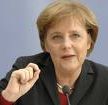
To cut to the chase, in 1961 the Berlin Wall wass gebilden, in 1989 it fell to a barrage of rock videos from MTV, and in 1990 Germany reunited, then in 2005 elected a woman as chancellor, Angela Merkel (1954-), just in time to greet all their new Muslim immigrants and U.S. president Barack Hussein Obama II. At least she's white, straight and nominally Lutheran, although a dyed-in-the-wool Commie?
Enjoy your sausage and kraut.





